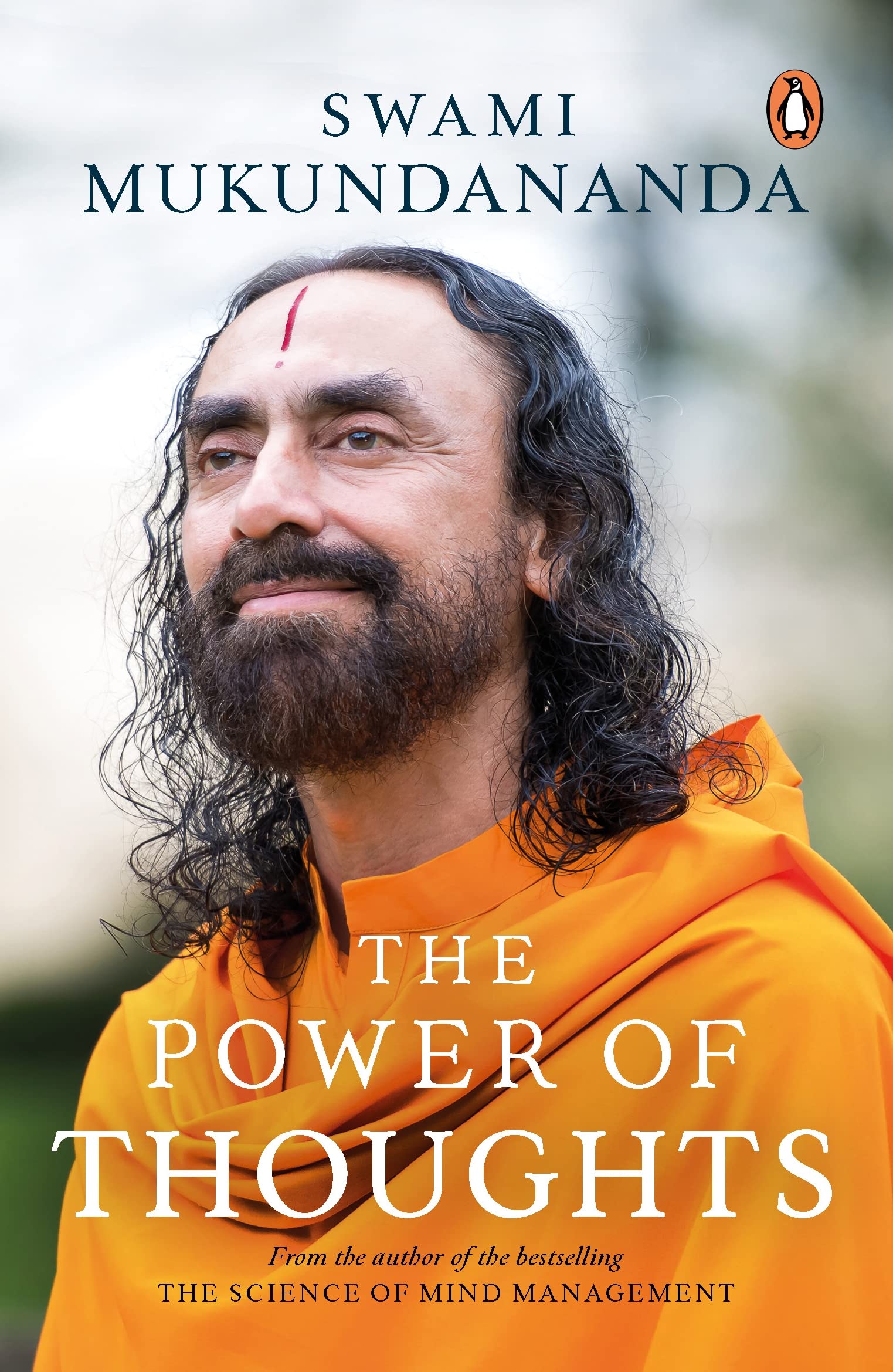Swami Mukundananda is a world-renowned spiritual teacher from India and an international authority on mind management. He earned his degrees from the prestigious IIT Delhi and IIM Calcutta but chose to renounce a promising corporate career and embrace monkhood. He studied Vedic scriptures at the feet of Jagadguru Kripaluji Maharaj. For almost four decades now, Swami Mukundananda has been sharing his vast knowledge through his books, lectures, and life-transformation programs. Indica Yoga talks to Swamiji about his new book, The Power of Thoughts, and explains how we can find joy even in the most difficult situations in life.
Sophia: What inspired you to write The Power of Thoughts?
Swami Mukundananda: We all wish to live a happy and a hugely successful life. However, most of us are either not aware of the resources required and costs involved or have a wrong notion of them. You will be surprised to know that the single most effective ingredient behind any accomplishment are our thoughts. Our mind mass-produces 60,000 of them daily, which result in our experience of happiness and distress. Our own thoughts are the precursors of all we do in our life. Hence if we know the tools and techniques to transform our thoughts produced by the mind, it will empower us for an incredible life.
Hence, this book was written to reveal the ancient secrets of mind-mastery that were discovered by the elevated sages and yogis. These esoteric concepts have been presented in a simplified yet modern context with real-life examples, humorous stories, sound logic and present day scientific research. This book is a humble attempt to serve mankind by enabling every individual to discover and utilise the free yet powerful treasure chest of resources they inherently own, for living a healthier, happier and more successful life.
Sophia: What role does meditation play in taming/controlling thoughts?
Swami Mukundananda: Popular notions often equate meditation to a mere state of thoughtlessness. However, in reality, meditation is the mind’s focus on the subject of its attachment. For example, a writer meditates on the plot unfolding in his mind. A drunkard meditates on his next bottle of alcohol. And a lover meditates on his beloved. Our mind takes on the nature of whatever it contemplates upon. Focusing the mind on a mundane subject makes our consciousness material. In contrast, contemplating a divine subject makes the mind divine. It results in pure and elevating thoughts. Such meditation cuts our bad sanskars (mental imprints from past lives) and unproductive habits and develops a strong resolve for progress in life. We remain equipoised amidst adversities. Such an internal ambience invariably propagates positivity to the external environment as well. Thus, mentally bathing in the power, purity and prowess of the Almighty reins the unbridled mind. This is true meditation, as it deep cleans the many layers of our mind.
Sophia: How do negative thoughts affect us and how can we overcome this?
Swami Mukundananda: Negative thoughts dawn in the form of lust, anger, greed, hatred and illusion. When negativity becomes habitual, it presents a distorted vision of reality and deludes us into ignoring the numerous blessings bestowed upon us. It feeds our bitterness and undermines our motivation. They render us unproductive and erode our growth mindset by providing self-justifications to be less than our best.
You can exercise a 3-step system to deconstruct negative thoughts and create a healthier perspective of life:
1) Dilution. Distance yourself from the negative thought by reducing your attention towards it. Tell yourself, “Let the mind play its mischief. I will not associate with this thought.” The thought will become infertile.
2) Substitution. Replace the negative harmful thought with a positive beneficial thought. For example, if the mind is saying, “Nobody likes me in the whole world,” remind yourself of people who do love and care for you.
3) Sublimation. Build a positive thought-stream further. Positivity is infectious. Hence, regular association with Saints can help you develop the ability to discern good thoughts from bad ones.
Sophia: At times, when we’re dealing with difficult situations/emotions, it is very hard to remain positive. What would be your advice on how to deal with such difficulties with grace and strength?
Swami Mukundananda: The universe is full of dualities. For eg, there is day and night; happiness and sadness; life and death; etc. Hence no adversity is permanent. Nobody can avoid painful circumstances. But nobody can force us to be unhappy also in them. In the present, we may not be able to connect all the dots but if we believe it to be a blessing, we can make the adversity work to our advantage. That’s why they say, “Pain is inevitable; misery is an option.” Viktor Frankl – a Jewish neurologist and psychiatrist had lost his entire family and was himself subjected to inhuman treatment in concentration camps led by Hitler. However, he discovered that a person who has nothing left in the world can still experience bliss by harbouring the right thoughts in his mind. He decided to be cheerful, irrespective of the lack of control over the external situation.
Most people define a good life as material prosperity, good health, harmonious relationships and an unsuccessful life as the reverse. But if our goal is higher – to become the best version of ourselves, then every circumstance can be looked upon as a teacher to propel growth for a meaningful life. Remember, we are not the body, and we are also not the mind; we are divine souls, distinct from both. As eternal parts of the Supreme Divinity, we are inherently blessed with infinite potential for greatness.
Sophia: What is the relationship between mind-intellect and how can we cultivate both simultaneously for inner personality development?
Swami Mukundananda: The Mind (mana) creates thoughts, feelings, desires, hankerings, and aversions. The Intellect (buddhi), analyses, decides and discriminates between good and the bad. There is also the subconscious mind (chitta), which is the storehouse of impressions and memories. When we identify with our body and its attributes, it results in ego (ahankār) or sense of ‘I’ness. These are not four separate entities but rather different functioning of the same entity called the mind or also known as antahkaran.
We all have experienced the battles between the mind’s cravings and the intellect’s knowledge. The root cause of all negativity is an impure mind. The meditation technique described above is the most effective way to purify the mind. Also, in daily life, whenever the mind urges something unproductive or indulges in an inferior pleasure, do the opposite of what it is craving for. This way you will loosen the grip of the mind. Such repeated behaviour will free us from the mind’s likes and dislikes, and enable us to prioritise worthy goals in life. In addition, when the intellect decides something is important, it has the ability to control the mind to rise over frailties. That is how the whole world manages to get to work every Monday morning, despite the complaining mind. Behind the scenes is the vivek shakti (power of discernment) of the Intellect. Feed it with true knowledge that enables good decision-making and equips you with self-discipline. Hearing and contemplating divine knowledge is key. In fact, the teachings of the Bhagavad Gita are known as Buddhi Yog or the ‘Yoga of the Intellect’. Such gems of eternal wisdom help you choose the right goals in life and make you resilient despite the difficulties on the path.
Sophia: How does positive thinking aid our faculties of sound discrimination?
Swami Mukundananda: When we think positively, we do not seek preconditions for a happy attitude. Rather than brooding over problems, we remain focussed on what we want, and how to get it. We take responsibility for our shortcomings and weaknesses. Such a solution-oriented mindset makes us effective at work and joyous in our relationships. Thus, positivity breeds the mindset of reflection, learning, excellence and growth.
Positive thinking makes one acknowledge the fact that the one can never eliminate all negatives from the world. Hence, we choose to see the glass always as half-full rather than half-empty. Instead of riveting our mind on the deficiencies and shortfalls of our life, positive thinking gravitates us to count the innumerable graces that have already been bestowed on us. In them, we discover millions of reasons for being happy!
Positivity sprouts in us one of the most supreme virtues – that of humility. When things do not go as per our plans, despite our best efforts, we are still able to appreciate life, rather than allowing our ego to fuel our frustration. We acknowledge that universe has not been made for the fulfilment of our puny desires. We perceive the abundance in the universe orchestrating circumstances to bestow infinite opportunities for our soul’s evolution towards its divine destiny. In these ways, instead of waiting to reach happiness sometime in the future, positive thinking empowers us to adjust our attitude to discover it here and now.
Sophia: In the second half of your new book, you have explained strategies to unleash one’s thinking to live life to the fullest. Can you list some techniques here?
Swami Mukundananda: Most of us allow thoughts to happen to us. But as humans, we have the freedom to choose our thoughts. Here are some techniques:
- Intentional Thinking. Instead of reactive thinking, if we ask ourselves the question, “How would I like to feel in this situation?” Possibly, more relaxed, more focused, or more loving? Once the goal is set, exert control over the mind and brain to create those sentiments. This is intentional thinking, where we trash the programmed response and put in conscious effort to think beautiful, positive and beneficial thoughts; such emotions that will help us grow.
- Revise the Desirable Thoughts. Depending upon our goal, we can revise conducive thoughts. For example, if we want to overcome defects or build virtues, we can revise thoughts such as “I must not be judgmental. I do not know people’s story”; “I must develop inner strength and learn to persevere. I will not give up in the face of challenges.” etc. Just as any kind of practice is difficult, mental practice or deliberate contemplation is also a laborious task and requires forcing the uncooperative mind. Gradually, the discomfort of the practice eases and the mind becomes nimbler, more disciplined, and more cooperative to our commands.
- Think New Thoughts. Like you try new places to eat, new clothes to wear, etc., try practicing new thoughts as well. For example, instead of “I can never lose weight”, think “If I work at it, I can surely become slim and trim.” Instead of “I do not know what will happen in future”, think “The future will be much better than the past.”
Notice how your feelings change as you change your thoughts. With practice, you will discover that not only do you experience positive thoughts more often, but they also start becoming more insightful.
Sophia: What are you reading right now?
Swami Mukundananda: Gopi Geet from the Shreemad Bhagavatam.
Sophia: What is your advice to modern yoga practitioners?
Swami Mukundananda: It is indeed a delight to see the popularity of yoga all over the globe. However, yoga is a much higher science than a mere physical regime. The Sanskrit word Yog means Union with God in loving devotion. A true yogi is one whose mind is fully absorbed in God. Hence, pursuit of yoga must be accompanied by the pursuit of spirituality. The process involves seeking divine knowledge from sacred sources and the practice of Karm Yog, i.e., performing all activities in the spirit of humble service to God without any desire whatsoever for rewards. It is a very powerful way to rise over bodily consciousness entangled in physical complaints, mental hankerings and aversions of the world, emotional suffering, restlessness, etc. Karm Yog makes us recognise our interconnectedness with God and with all living entities, by aligning our thoughts, words and actions for a higher purpose. It is highly transformative in becoming disease-free not just physically but also mentally. This is the foundation of holistic wellness.
Sophia: How can we use the power of thoughts to serve humanity and also our nation?
Swami Mukundananda: The human form is a gift. We have the responsibility of living by the wisdom of the intellect and not by the whims of the mind. Therefore, life, as a virtuoso sculptor, is intent on making masterpieces of us by presenting us circumstances that require us to strive to grow from within. Inner growth is all about transforming our thoughts and honing our thinking skills. Such responsible individuals will have the capacity to transform others and enrich their lives as well. Hence, each one of us needs to consciously take responsibility for each thought that we create. Each single thought has its own energy. The first person to feel the impact of that energy is us. The manifestation of that subtle metaphysical energy influences others as well as the environment also deeply. Hence, the greatest work for benefitting the world around us will happen when we invest to rise over negative thinking and in creating new, powerful, productive and positive patterns of thinking.
One of the best thinkers in western history, Albert Einstein, said, “Thinking is hard work; that’s why so few do it.” I would urge you to manifest your highest potential by becoming a better thinker.
Swamiji’s new book is available on Amazon India.






